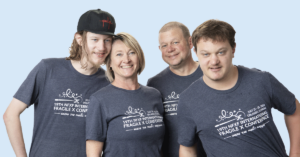About the Study
Who can participate?
Boys ages 2–6 years old with a diagnosis of Fragile X Syndrome based on full mutation of the FMR1 gene may be eligible to participate.
What will happen in the study?
If the individual qualifies and decides to be in this research study, they will come to the Labs of Cognitive Neuroscience at Boston Children’s Hospital for two visits spaced one year apart.
There will two visits, each one year apart, at the Labs of Cognitive Neuroscience at Boston Children’s Hospital. Each visit includes:
- Clinical and behavioral assessments to evaluate your child’s thinking, motor skills, language skills, and social communication.
- Measure your child’s brain activity using electroencephalography (EEG). EEG is a safe and radiation-free way to measure brain activity in response to different sounds and pictures.
- Completion of questionnaires.
What are the good things that can happen from this research?
Being in this research may not help you right now. When we finish the research, we hope that we will know more about both Fragile X syndrome, Down syndrome, and autism spectrum disorder. This may help other children and adults with FXS, DS, or ASD in the future.
You may benefit by receiving detailed information about your child’s cognitive, language, and communication skills.
What are the bad things that can happen from this research?
There are minimal risks to the procedures we are using.
- Children may react negatively to some of the behavioral assessments (e.g., frustration, boredom)
- Children may experience discomfort during the EEG net placement or recording
- Risk of participant confidentiality through creation of video recordings of behavioral and EEG assessments
There may be other risks that we do not know about yet.
Will I or my child be paid to complete this study?
Participants receive $50 and a small toy each visit, as well as a written report about your child’s development. Additionally, we will provide free parking and child care for siblings.
Travel reimbursement is available for eligible families.


